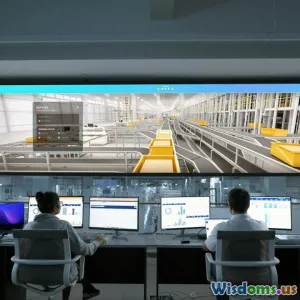
AI and Automation: Enhancing Business Operations
6 min read Discover how AI and automation are revolutionizing business operations, boosting efficiency, and driving innovation. (0 Reviews)
AI and Automation: Enhancing Business Operations
In the rapidly evolving landscape of modern business, the integration of Artificial Intelligence (AI) and automation technologies has emerged as a critical factor in enhancing operational efficiency and driving innovation. This article explores the multifaceted impact of AI and automation on business operations, highlighting how these technologies streamline processes, improve decision-making, and create competitive advantages.
Understanding AI and Automation
Artificial Intelligence refers to the simulation of human intelligence in machines programmed to think and learn. Automation, on the other hand, involves using technology to perform tasks without human intervention. When combined, AI and automation can transform business operations by optimizing workflows, reducing costs, and enhancing productivity.
The Benefits of AI and Automation in Business Operations
1. Increased Efficiency
One of the most significant advantages of AI and automation is their ability to increase efficiency. By automating repetitive and mundane tasks, businesses can free up their workforce to focus on more strategic activities. For example, robotic process automation (RPA) can handle data entry, invoice processing, and customer support inquiries, enabling employees to dedicate their time to higher-value tasks that require creativity and critical thinking.
2. Enhanced Decision-Making
AI-driven analytics can provide valuable insights into business performance, customer behavior, and market trends. By analyzing large datasets quickly and accurately, AI can help managers make informed decisions based on real-time data. For instance, predictive analytics can forecast sales trends, allowing businesses to adjust their strategies proactively.
3. Improved Customer Experience
AI and automation can significantly enhance the customer experience. Chatbots and virtual assistants are increasingly used to provide immediate support, answer queries, and guide customers through their purchasing journey. This 24/7 availability ensures that customers receive timely assistance, leading to higher satisfaction and loyalty.
4. Cost Reduction
Automation reduces operational costs by minimizing the need for manual labor and decreasing the likelihood of human errors. Additionally, AI can optimize resource allocation, ensuring that businesses operate at maximum efficiency without overspending.
5. Scalability
AI and automation technologies provide businesses with the flexibility to scale operations quickly. As demand fluctuates, automated systems can adjust to changes without the need for extensive re-training or new hiring processes. This adaptability allows businesses to respond effectively to market dynamics.
Real-World Examples
Case Study: Retail Industry
One notable example of AI and automation in action is the retail sector, where companies like Amazon utilize AI algorithms to analyze customer preferences and manage inventory levels. Automated warehousing systems streamline order fulfillment, while AI-driven recommendations enhance the shopping experience, leading to increased sales.
Case Study: Manufacturing
In the manufacturing industry, companies are adopting AI-powered robots to perform complex tasks such as assembly and quality control. These robots work alongside human operators, increasing production rates while maintaining high standards of quality.
Challenges in Implementing AI and Automation
While the benefits are substantial, integrating AI and automation into business operations is not without challenges. Key issues include:
- Data Privacy and Security: Companies must navigate complex regulations surrounding data usage to protect customer information and maintain trust.
- Skill Gap: There is often a lack of skilled professionals who can manage and analyze AI systems, leading to a need for training and development initiatives.
- Change Management: Organizations must foster a culture that embraces change and innovation, as employees may be resistant to adopting new technologies.
Conclusion
The integration of AI and automation into business operations is not just a trend; it is a necessity for organizations seeking to remain competitive in today's fast-paced environment. By enhancing efficiency, improving decision-making, and enriching customer experiences, these technologies are reshaping the way businesses operate. As companies continue to embrace AI and automation, they pave the way for a future where innovation and operational excellence go hand in hand.
In summary, businesses that leverage AI and automation effectively will not only enhance their operations but also position themselves for long-term success in an increasingly digital world.
Rate the Post
User Reviews
Popular Posts




















